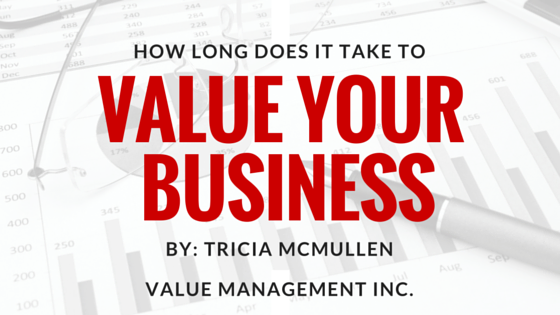
As is often the case in the valuation world, the answer to the above question is it depends!
At VMI, our general timeline to complete a business valuation is typically between three to six weeks. During busier seasons (March through June in VMI’s case) it may take closer to the upper end of the range.
Show me the documents
The most important factor impacting the time to complete a valuation is the receipt of all of the necessary information, including conducting the due diligence meeting or call. The sooner the information is received, the sooner the appraiser can get started!
Easy as pie?
The complexity of the project is also a factor that affects timing. The subject entity’s structure (single entity vs. holding company with multiple subsidiaries or other multi-tiered entities), the number of valuation dates, the interest or interests being valued (simple capital structure or complex with various classes of securities) are all factors to consider when establishing the project schedule.
The size of the subject entity (based on the level of sales) can also makes a difference. Typically, larger companies are by their nature, more complex. The diversity in geographic markets, product lines, customers, etc. often requires more in-depth analysis, thus, lengthening the project completion timeline.
Adding to the engagement’s complexity are the number of adjustments that need to be considered/made to the financial statements. Discretionary expenses, accounting related adjustments, atypical or non-recurring or non-operating expenses have to be investigated and a determination made if adjustments are appropriate.
How we do what we do: The Process
At VMI, a senior financial analyst is assigned to each project. The data gathering and information input stages are followed by the determination of value step.
The three approaches to value (income, market and asset) are considered for every assignment. Like the pureness of Ivory™, the income approach is used in 9944⁄100 percent of our valuations.
The market approach is used when guideline public companies or target companies sharing similar investment characteristics with the subject company are identified. If guideline public companies or transactions are identified, a quantitative and qualitative analysis must be completed to determine the valuation multiples that may be applied to the subject company. If no relevant guideline companies or transactions are identified, we may expand our analysis and consider broader market indicators. When appropriately used, the market approach definitely increases the time required to complete the valuation.
For more information on the valuation process, visit the Resource page on the VMI website (www.valuemgmtinc.wpengine.com) and look for our slide presentation titled “The Guide to Understanding Business Valuations” which was issued on August 18, 2015.
What’s next?
The senior financial analyst will consult with the director of business valuations or the managing director as various issues arise during the course of the valuation process. Once the senior analyst has completed his/her analysis and has arrived at a preliminary conclusion, the valuation is reviewed with the director of business valuations. At that time, the valuation worksheets/analyses are submitted to a different analyst for source and math checking.
The valuation is then reviewed with and approved by the managing director.
The level of reporting will also impact the turnaround. As implied by its name, the comprehensive report provides a very detailed reporting of our analyses and our conclusion of value. While it does not contain the same level of detail as the comprehensive report, writing up the letter report is also factored into the timeline.
As the level of reporting decreases, the time required to complete the engagement is reduced accordingly. The timeline to issuing a final report may be extended in cases where we first submit a draft report to the client for review but the client’s comments or go ahead to finalize are not received in a timely manner.
Other factors that may extend the valuation project completion timeline are engagements that require a presentation be made to the trustee (ESOPs), executor or board of directors. Litigation assignments may involve depositions or trial preparation and other engagements may be subject to audits (IRS or Department of Labor (ESOP valuations)) that require the appraisal firm to respond to audit questions.
Need it sooner?
Under special circumstances, and if all of the valuation stars align (all information is readily available, the schedule permits, etc.), it may be possible to expedite the assignment and reduce the timeframe to completion.
Good and fast isn’t cheap! Expediting a project usually means reprioritizing the existing backlog. When the valuation firm is asked to give a project priority, the project may have a higher cost as the firm has to reallocate limited resources to devote the time necessary to fast track a project.
Fast and Cheap = Trouble
Getting a valuation done fast and cheap could end up costing more! “Pay now or pay later” can sum up the result of going the fast and cheap route if the end result doesn’t give you what you need.
So beware of offers by firms claiming they can perform quality (reasonable and supportable) valuations for peanuts! A “measure twice cut once” philosophy is a good one to have if you want the job done right the first time!

